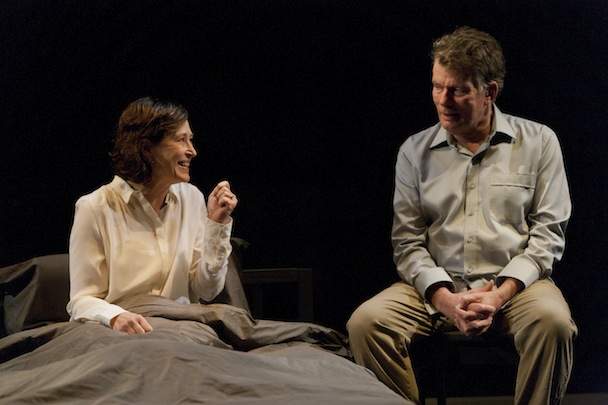And No More Shall We Part
Discover love, death, what it takes to close the curtain on the days ahead you've dreamed of and what it means to let someone go.
Overview
Warning people not to wear mascara in anticipation of the tears you're going to provoke is a gutsy move. You risk putting undemonstrative types on their guard and liberal criers in front of an insuperable mountain of anticipation.
Still, some situations are so inescapably, heavily tragic as to warrant the disclaimer. And No More Shall We Part is one of them. It's about love, and death, what it takes to close the curtain on the days ahead you've dreamed of and what it means to let someone go. Don (Russell Kiefel) and Pam (Linda Cropper — that's Geraldine Proudman, for the Offspring lovers) have built their whole lives together, filled a home with family, rediscovered their private lives when their kids have left and now, in their late 50s and early 60s, find themselves facing new inevitabilities as Pam's cancer worsens. There's not much more to say of their path through assisted suicide; this is a journey best undertaken blindly, with only the people on stage to guide you over the rocks ahead.
The actors each shine in moments — she wrapping up her frailty with strength, he looking at her with such intensity it could start a fire — and what they give each night must drain them entirely. It's beautifully staged in the intimate theatre, which takes you past pastel walls and under doorways into the couple's home and fixes you to Pam's bedside.
Stories as emotive as And No More Shall We Part are highly personal, so whether you think it succeeds will be personal, too. The extent to which this particular scenario, with this particular writing and these particular actors affects you is nearly unpredictable. On this night, some people were in floods of tears from the start, some people choked up in a moment that floored them, and some people appeared either unmoved or very stoic.
For me, the everyman and woman characters and interjection-heavy dialogue that sometimes veered into the distractingly stilted were obstacles to fully realising the latent power of the subject. However, it still stands as an accessible and amazing vehicle for this fraught topic to be brought out into the light of public discourse, which may have been what really earned this play its 2010 AWGIE Award. And No More Shall We Part picks up that great prerogative of art to open up audiences to different perspectives on big issues through small, simple acts of empathy. You'll leave the theatre thinking and talking about it, whether your mascara's run or not.





